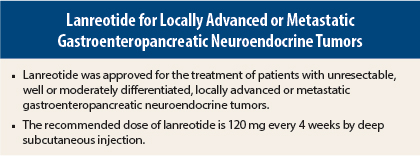In the Clinic provides overviews of novel oncology agents, addressing indications, mechanisms, administration recommendations, safety profiles, and other essential information needed for the appropriate clinical use of these drugs.
On December 16, 2014, lanreotide (Somatuline depot injection) was approved for the treatment of patients with unresectable, well or moderately differentiated, locally advanced or metastatic gastroenteropancreatic neuroendocrine tumors to improve progression-free survival.1,2
Supporting Study
Approval of lanreotide was based on findings in an international double-blind trial in which 204 patients with unresectable, well or moderately differentiated, locally advanced or metastatic, nonfunctioning gastroenteropancreatic neuroendocrine tumors were randomized to receive subcutaneous lanreotide (120 mg) or placebo every 28 days.2,3 Neuroendocrine tumors arose outside the pancreas in 55% of patients. Patients had a median age of 63 years (range, 30 to 92 years), 53% were male, 95% were white, 4.4% had disease progression in the 6 months prior to study enrollment, 14% had received prior chemotherapy, and 69% had grade 1 tumors; more patients in the lanreotide group had greater than 25% hepatic tumor involvement (39% vs 27%).
Progression-free survival was significantly prolonged with lanreotide (median not reached vs 16.6 months, hazard ratio = 0.47, P < .001). The median progression-free survival in the lanreotide group exceeds 22 months.
How It Works
Lanreotide is an octapeptide analog of natural somatostatin. The mechanism of action of lanreotide is believed to be similar to that of natural somatostatin in inhibiting various endocrine, neuroendocrine, exocrine, and paracrine functions.
How It Is Given
The recommended dose of lanreotide is 120 mg every 4 weeks by deep subcutaneous injection. Treatment should continue until disease progression or unacceptable toxicity. There is no recommended dose adjustment for mild or moderate renal impairment. Data are insufficient to recommend a dose in patients with severe renal impairment or hepatic impairment of any severity.
Somatostatin analogs may decrease metabolic clearance of drugs metabolized by CYP enzymes, due to suppression of growth hormone. Drugs mainly metabolized by CYP3A4 that have a low therapeutic index should be coadministered with caution. Lanreotide may cause a reduced heart rate and should be used with caution in at-risk patients.
Safety Profile
In the supporting trial, the most common adverse events of any grade in the lanreotide group were abdominal pain (34% vs 24% in the placebo group), musculoskeletal pain (19% vs 13%), vomiting (19% vs 9%), headache (16% vs 11%), injection-site reaction (15% vs 7%), hyperglycemia (14% vs 5%), hypertension (14% vs 5%), and cholelithiasis (14% vs 7%). The most common severe adverse events were abdominal pain (6% vs 4%), musculoskeletal pain (2% vs 2%), and vomiting (2% vs 2%). The most common serious adverse event was vomiting (4%). Treatment was discontinued due to adverse events in 5% of lanreotide patients and 3% of placebo patients.
Lanreotide carries warnings/precautions for gallstones, glucose metabolism (hypoglycemia and hyperglycemia), and cardiac function (decreased heart rate). Periodic patient monitoring for gallstones should be considered. Glucose monitoring is recommended. ■
References
1. US FDA Press Release: Approved drugs. Lanreotide. Available at http://www.fda.gov/Drugs/InformationOnDrugs/ApprovedDrugs/ucm427065.htm. Accessed January 7, 2015.
2. Somatuline depot (lanreotide) injection prescribing information, Ipsen Biopharmaceuticals, Inc, December 2014. Available at http://www.accessdata.fda.gov/drugsatfda_docs/label/2014/022074s011lbl.pdf. Accessed January 7, 2015.
3. Caplin ME, Pavel M, Ćwikła JB, et al: Lanreotide in metastatic enteropancreatic neuroendocrine tumors. N Engl J Med 371:224-233, 2014.
Report Adverse Events
Health-care professionals should report all serious adverse events suspected to be associated with the use of any medicine or device to FDA’s MedWatch Reporting System by completing a form online at http://www.fda.gov/medwatch/report.htm, by faxing (1-800-FDA-0178), by mailing the postage-paid address form provided online, or by telephone (1-800-FDA-1088).


